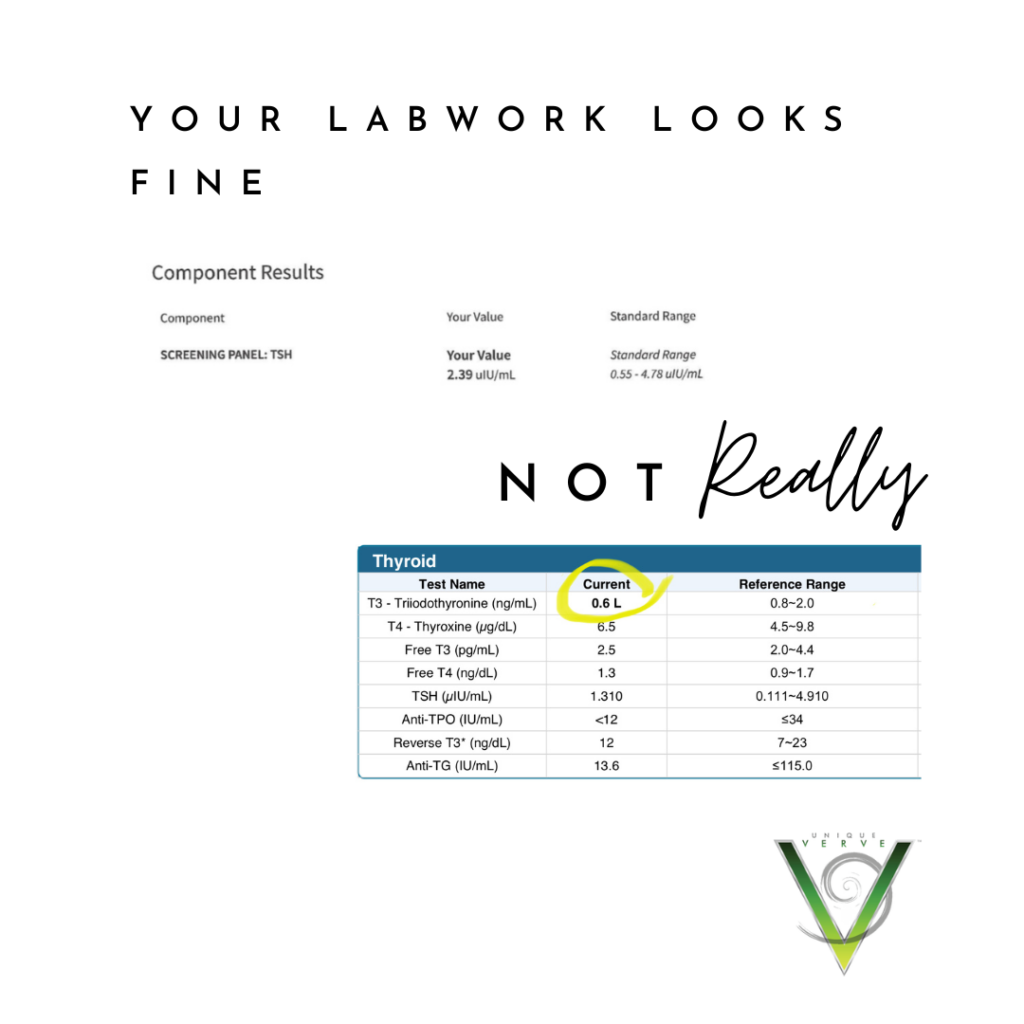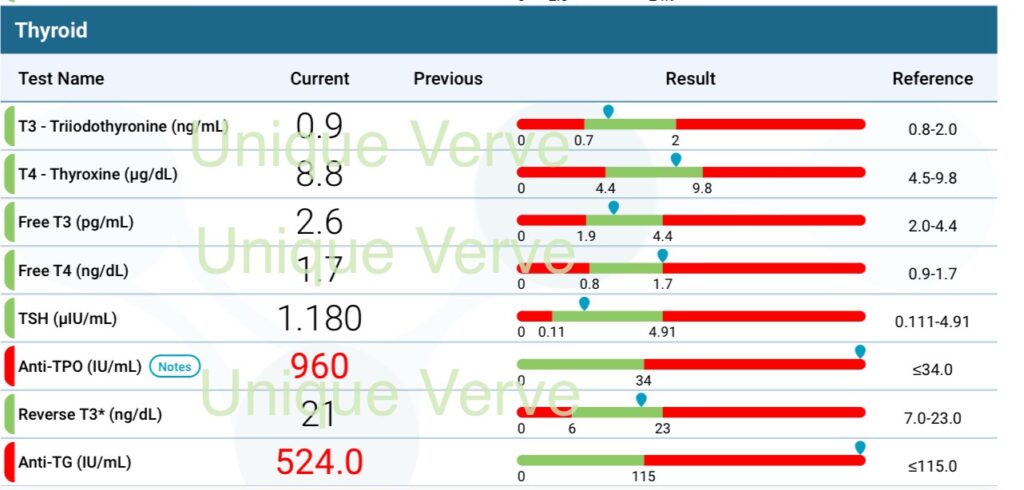Thyroid Lab Missteps
Thyroid Lab Missteps: Why Conventional Testing Often Misses Hypothyroidism

Conventional testing often overlooks early thyroid dysfunction. Learn the difference between standard and functional medicine testing, symptoms to watch for, and how to uncover the root cause of low thyroid function.
If you’ve been told your labs are “normal,” yet you still struggle with fatigue, weight gain, hair loss, depression, mood imbalances or brain fog — you’re not alone. Conventional testing often misses the deeper story behind low thyroid function.
As a functional medicine practitioner, I see this pattern frequently: clients come in with classic hypothyroid symptoms, yet their doctor says, “Your thyroid lab looks fine.” The problem? TSH doesn’t tell the whole story.
Conventional vs. Functional Thyroid Testing
Conventional testing usually measures only:
- TSH (Thyroid Stimulating Hormone)
- Occasionally Total T4 (thyroxine)
These markers help identify advanced hypothyroidism but often miss early dysfunction.
Functional Medicine testing provides a comprehensive look at health and includes:
- TSH – this is not a thyroid hormone but a brain’s hormone which signals the thyroid
- Total T4 & Free T4 – production of thyroid hormone in the thyroid gland
- Total T3 & Free T3 – the most bioactive thyroid hormone available to cells because it binds to its receptors with much greater affinity than T4, making it the most potent form. Produced mostly peripherally and to a lesser extent by the thyroid gland itself.
- Reverse T3 – an inactive form that can block T3 receptors (often elevated in stress, inflammation, high estrogen states and illness dynamic like Covid)
- Anti-TPO (thyroid peroxidase antibodies) – identifies autoimmune thyroiditis
- Anti-Tg (thyroglobulin antibodies) – another key autoimmune marker
By looking at this full picture, we can identify whether the system is underactive, conversion is impaired, or if the immune system is attacking tissue — even before TSH is out of range.

This image illustrates the importance of running a comprehensive thyroid panel that looks beyond just TSH and T4.
As you can see in this slide, my client came to me with classic hypothyroid symptoms — frequent illness (monthly), low energy, hair loss, digestive issues, and poor sleep. Her conventional lab tests included only TSH and T4, both of which appeared “normal.”
However, once we ran a full thyroid panel, the deeper picture emerged. We discovered autoimmune activation, with both thyroid antibodies (Anti-TPO and Anti-Tg) elevated. This demonstrates why it’s essential to test both antibodies simultaneously — because sometimes only one may be elevated. If only one is checked, autoimmune thyroid disease can easily be missed.
We also noted suboptimal Reverse T3 levels, which can block active T3 from binding to receptors, further contributing to hypothyroid symptoms.
While her TSH, T4, and Free T4 levels looked normal, the complete panel revealed underlying Hashimoto’s thyroiditis and functional hypothyroidism that conventional testing alone would have overlooked.
Why “Normal” Labs Don’t Always Mean Optimal Thyroid Function
Conventional reference ranges are broad, representing 95% of population average and are designed to detect disease. Functional medicine focuses on prevention and optimal or functional ranges, which are narrower and reflect how your thyroid should function for vibrant health.
For example:
- A “normal” TSH may range from 0.5 to 4.5, but functionally, most people feel best between 1.0 and 2.0.
- Free T3 might fall “within range,” yet if it’s in the low end, symptoms of low thyroid activity can persist.
- Ratio between RT3 and FT3 plays a significant role as well
Common Symptoms of Low Thyroid Function (Hypothyroidism)
Because it drives the body’s cellular basal metabolic rate (especially in partnership with cortisol), it influences the speed of everything metabolic in the body, thus when it slows down, it can have very broad and systemic effects.
| Systems | Symptoms |
| Weight & Metabolism | Weight gain, difficulty losing weight, obesity, fatty liver |
| Energy | Fatigue, low energy, sluggishness, afternoon crashes |
| Mood | Depression, anxiety, brain fog, mood imbalances |
| Skin & Hair | Dry skin, brittle nails, hair loss, thinning outer eyebrows |
| Digestion | Constipation, bloating, IBS symptoms, recurring dysbiosis |
| Reproductive | Irregular periods, PMS, infertility, heavy bleeding |
| Temperature Regulation | Cold hands and feet, intolerance to cold |
| Cardiovascular | Slow pulse, cardiac arrhythmia, low blood pressure, elevated LDL |
| Immune Function | Frequent illness, high viral loads |
Root Causes Functional Medicine Investigates
- Chronic stress and adrenal dysfunction
- Nutrient deficiencies (iodine, selenium, zinc, iron, vitamin A)
- Microbial imbalances or gut dysbiosis
- Leaky gut
- Chronic inflammation or infections
- Environmental toxins, mycotoxins and heavy metals
T4 to T3 Conversion – Why Organ and Metabolic Health Matter
Producing thyroid hormones is only half the story — the body must also convert the pro-hormone (T4) into the active form (T3) to regulate metabolism, energy, and cellular activity. This crucial conversion happens peripherally, primarily in the liver (~60%), gut (~20%), and kidneys (~20%) through enzymes known as deiodinases intra-cellularly.
When these organs are not functioning optimally, your body will naturally struggle to make enough active T3 — leading to low thyroid symptoms even if your TSH and T4 appear normal.
Several common factors can interfere with this conversion process:
- Liver congestion or toxicity: The liver plays the largest role in T4-to-T3 conversion. Toxins, medications, high blood sugar, insulin resistance or fatty liver that have a negative impact on the liver’s function may impair this conversion leading to hypothyroidism.
- Gut dysbiosis: An imbalance in gut flora (some of the signs include constipation, diarrhea, bloating and IBS symptoms), inflammation, or infections reduce T3 production in the gut leading to low thyroid function.
- Blood sugar dysregulation & insulin resistance: High insulin levels and blood sugar dysregulation impair receptor sensitivity, leading to hypothyroidism, often seen in metabolic syndrome and type 2 Diabetes. High blood sugar has a negative impact on the liver’s and kidney’s function which will impair T4 to T3 conversion.
- Medications: Beta-blockers like prapronolol, steroids, birth control pills, and certain antidepressants can suppress T4-to-T3 conversion and raise Reverse T3.
- Nutrient insufficiencies/ deficiencies: Selenium, zinc, vitamin A and iron are essential cofactors for this enzymatic process — deficiencies or insufficiencies can impair conversion efficiency.
Recognizing the symptoms of low thyroid function can lead to better health outcomes.
In short, you need healthy liver, gut and kidneys to produce healthy thyroid activity. Supporting liver detoxification, stabilizing blood sugar, optimizing gut health, and replenishing key nutrients are foundational for proper hormone conversion and true vitality.
Functional Approach and Targeted Support
Once we uncover why your thyroid is underperforming, we can address it through a personalized plan that may include:
- Nutrient repletion with targeted formulas like:
- Unique Verve Iodine Supreme – supports thyroid hormone production
- Essential Zinc, Essential A – key nutrients for T4 to T3 conversion
- Liver Guard – protects the liver from toxins, medications, oxidative stress and supports T4 to T3 conversion
- Omega-3 BioPure – helps reduce inflammation and improve receptor sensitivity
- Adrenal support to optimize cortisol rhythm and thyroid function
- Gut healing protocols to restore healthy microflora and improve nutrient digestion and absorption
- Lifestyle and detox strategies to lower toxin burden and inflammation
The Takeaway
If you’ve been dismissed with “normal labs” but still don’t feel well and struggle with low thyroid symptoms, it’s time to dig deeper. Functional medicine thyroid testing offers clarity, not confusion; functional medicine doesn’t ignore your symptoms — so we can finally address the true root cause of your symptoms.
Your thyroid gland is highly responsive to your unique environment and stressors — including nutrient status, inflammation, toxins, infections, and emotional stress. In my functional medicine practice, I help identify the “perpetrators” that are interfering with normal thyroid functioning and preventing true healing.
I often observe that thyroid and adrenal dysfunction go hand-in-hand — they’re two sides of the same coin. When these systems are imbalanced, many clients experience only temporary improvements rather than sustainable results.
It’s not enough to simply support the thyroid; we must uncover and address the underlying triggers disrupting homeostasis. Only then can we restore optimal thyroid function, hormonal balance, and long-term vitality.
🌿 Ready to uncover what your thyroid is really telling you?
Book your Functional Medicine Comprehensive Health History Consultation to get a full thyroid panel and personalized plan for restoring balance and vitality. Don’t ignore the symptoms that your body is trying to communicate with you!
👉 Click here to learn more about my Functional Medicine program.

As a Certified Functional Medicine Practitioner my Expertise Encompasses:
- Immune System: frequent illness, UTIs, yeast infections
- Allergies, Asthma
- Skin Problems: acne, cystic acne, rosacea, dermatitis, ichthyosis, psoriasis, vitiligo, melasma
- Inflammation: arthritis, rhinitis, joint & muscle pain, migraines, headaches
- Sleep Disturbunces, Insomnia
- Gut Problems: IBS/IBD, bloating, acid reflux, gas, constipation, diarrhea, parasites, fungal/yeast overgrowths
- Hormonal Imbalances: PCOS, PMS symptoms, weight problems/inability to lose weight, thyroid problems
- Hair Loss, Alopecia
- Mood Imbalances: anxiety, depression, irritability
- Metabolic Dysfunction, Insulin Resistance, Type 2 Diabetes
- Optimizing Wellness for Successful Pregnancy
- Autoimmune Conditions: Hashimoto’s thyroiditis, grave’s disease, reumatoid arthritis (RA), lupus, etc
- Bone Health: osteopenia/ osteoporosis
- Effective Anti-Aging Strategies without Injectables with the inside-out & outside-in approach
- Detoxification of Heavy Metals, Mycotoxins, Environmental Toxins
- Reversing Breast Implant Illness
- Preparation for the Explant Surgery and Optimization of Wellness & Vitality Post-Explant
With Love and Gratitude,
Natalie Maibenko
Functional Medicine Practitioner
DISCLAIMER:
Information and content on this website is provided for information and educational purposes only, and is not intended as a substitute for the advice provided by your physician or other healthcare professional. No information offered here should be interpreted as a diagnosis of any disease, nor an attempt to treat or prevent or cure any disease or condition.
If you have any concerns or questions about your health, you should always consult with a physician or other healthcare professional. Do not disregard, avoid, or delay obtaining medical or health-related advice from your healthcare professional. Always speak with your healthcare provider before taking any medications or supplements and before making any changes to your health regimen.
Information provided on this website does not create a doctor-patient relationship between you and any professional affiliated with this website. Information and statements regarding dietary supplements have not been evaluated by the Food and Drug Administration and are not intended to diagnose, treat, cure or prevent any disease.
I am not acting in the capacity of a doctor, licensed dietitian-nutritionist, therapist, or psychologist and will not diagnose, treat or cure any disease, condition or other physical or mental ailment of the human body. Rather I serve as a mentor and guide who helps a client to reach her/his own health and wellness goals through implementing incremental, positive, healthy, sustainable lifestyle changes that help the client to live and thrive using simple methods.
